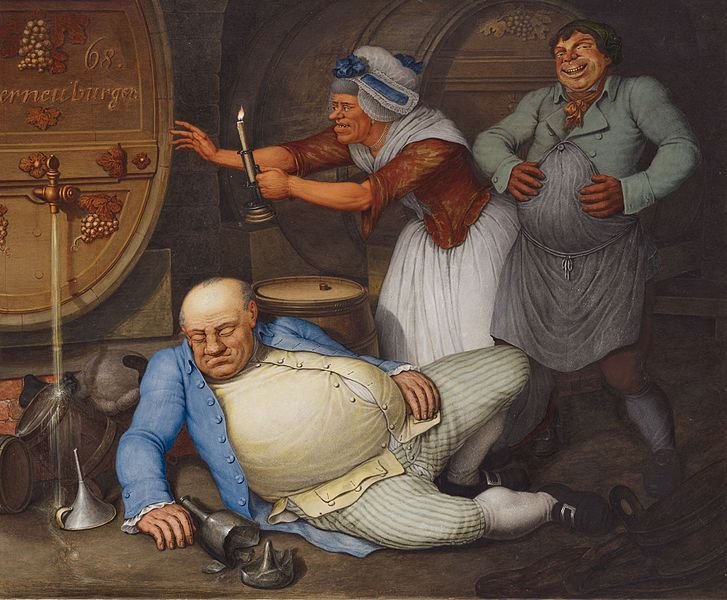Five Ways to Obliterate Belly Fat
“Der Säufer” by late German painter, Georg Emanuel Opiz, circa 1804
Image: Wiki Commons
Our current culture’s all but championed it, yet it’ll make your life a living hell.
No, this isn’t about the risks of importing snakes or getting married, nor is it a riddle. Although, riddles are underrated.
This is about the public health bane known as excess belly fat and how to blast it into oblivion.
Why such urgency if we’re not talking severed limbs or anything, right?
Remember when we showed you that recent study in which 55% of the male participants thought dad bods were all right? Yeah.
Think of your gut as a threshold that helps keep your overall health from going south. In other words, the bigger your gut gets, the harder it is on your health. And even the beacon of genetic might that is you could pay dearly if you don’t eat right, and that could happen in all manner of miserable ways — from developing type-II diabetes to full-on obesity.
Let’s make sure that doesn’t happen.
But First, A Word On A Key Culprit Behind Belly Fat (And What To Do About It)
One word: Cortisol.
You already knew refined sugars and trans fatty food like ice cream and fried chicken do nothing good for you (same with starchy carbs like white bread). But did you know about “stress belly”? It goes like this: When you stress out chronically, your brain tells your adrenal glands (both of which live above each kidney) to pump a steroid hormone called cortisol.
Thing is, cortisol isn’t bad in and of itself.
In fact, cortisol controls that “fight or flight” feeling you get when shit’s about to get real. i.e. Cortisol will keep you alert if you ever get chased by a machete-wielding manic, a good thing.
But constantly spiking cortisol — or always being stressed — fools your body into thinking things are worse than they really are. When that happens enough, your body does two things that suck: 1) It’ll also spike glucose (or blood sugar, your body’s internal fuel) to give you that boost to deal with the aforesaid maniac. 2) We both know there really is no maniac, and you’re just snapping over spilt milk. But since your body can’t tell the difference, it’ll turn that glucose to gut (or visceral) fat in no time.
Keep your cortisol production in check and you’ll be just fine.
How? Meditate. Hit the gym. Take up cycling. And get enough sleep.
Speaking of…
I. Sleep More, You Nocturnal Psychos
Sleep is so important for your bodily healthy you wouldn’t believe it, except you should.
It’s not hard to find bulletproof research tying little sleep to weight gain.
But one of the most compelling cases connecting weight gain to no sleep went down in 2016 at the University of Chicago. Drs. Erin Hanlon (a behavioural neuroscientist) and Eve Van Cauter (an expert in metabolism who only discovered little sleep hurts your body, not just your brain) led an experiment in which 14 healthy, “non-obese” people (ages ranged from 18 to 30-years-old) slept 8.5 hours a night for four nights then 4.5 hours a night for another four nights. Keep in mind all participants were kept on a strict diet the whole time.
What the researchers noticed is their sleep-deprived subjects felt hungrier and sluggish the the next day.
Why? A little something called the “endocannabinoid” (eCB) system, “a key player in the brain’s regulation of appetite and energy levels,” according to a report published on the study by the National Institute of Health (who also helped fund it). Basically, the participants with less sleep had higher eCB levels during the afternoon following a poor night’s sleep. That, in turn, had them snacking on less favourable snacks packed with fat and carbs so they could then feel satiated.
So sleep eight hours a night, you psychos.
Just, come on.
II. Smash More Protein
This doesn’t put baconators back on the menu.
It simply means the number reflecting your protein intake in grams should match the number reflecting your weight in pounds. To be clear, do not eat the equivalent of your weight in grams, you animals.
Look at it this way: If you weigh 185 pounds, you’ll have to wolf 185 grams worth of protein every damn day (if you’re an athlete, go ahead and double it up). And the leaner the source, the better. Think fish, shrimp, chicken, turkey, and egg whites. It’s not that red meat’s bad for you in moderation, but it is higher in fat.
So, why do it this way?…
The Thermic Effect of Food
Your body uses energy to break down what you chow, and that needed exchange can be used to your advantage since protein “costs” the most to break down of all macronutrients.
Here’s the other main reason more protein’s good for you: Satiation. Protein is “the most satiating macronutrient,” while fat is the least satiating.
Verdict: High protein diets keep you feeling fuller, and when you feel fuller you’ll consume less calories. Less calories equals less belly fat.
III. Combine Compound Resistance Training With Good Old Cardio
Science has shown time and time again that pairing “all-in-one” weight lifting with cardio will get you to the promised land fast.
In other words, more deadlifts than isolated movements like bicep curls.
A few other compound movements to swear by are classics like the chest press (which also targets your triceps), the military press (which hits your shoulders and your back), our favourite, the barbell squat (which works your quads, adductors, hamstrings, glutes, obliques and even your abs), and the pull-up (which hammers your back, lats, and yes, biceps).
And if no one told you yet, forget about sit-ups as a primary means to burn that gut. One simply cannot spot-reduce belly fat. They may as well etch that on the exterior walls of every gym in the world at this point.
IV. Eight Glasses Of Water A Day, No Excuses
The more you’re hydrated, the better off you’ll be. There’s no way around it.
Drinking at least eight glasses of water a day helps keep you feeling fuller, which means less chances of snacking on garbage you don’t need.
But not only that, more water intake could lead to fat loss thanks to “increased lipolysis,” the process by which we use stored fat for energy.
In theory, an increase in lipolysis stokes one’s metabolism, the overall way in which we convert food and drink into energy. So you’re not confused, yes, lipolysis is a part of the metabolic process, only it focuses on strictly burning fat.
V. Walk Hard (or Jog) First Thing In The AM On An Empty Stomach
If you’ve some baggage to lose, try breaking a sweat right after you wake up, whether it’s cardio, weights or both. Just make sure you don’t eat anything first.
Sound a little too counter-intuitive?
Not if you consider the results of an important, randomized controlled study published in spring 2020. Essentially, an international research team had 30 no-so-in-shape men divided into three groups: One that continued to do squat and two more that ran on treadmills every morning. The only distinction between the last two groups is one consumed a sugary drink pre-run and the other had a placebo one that tasted like vanilla, but was really water.
It’s no surprise the fist group improved nothing about their health. But of the guys who ran, it was the group with only water in them that burned twice as much fat as the sugary drink group.
Here’s the kicker — they both used up the same amount of calories.
This isn’t the first time a study of this sort’s yielded similar results, either.
They key, though — and it’s a big one — is getting past that 30-to-45-minute mark while keeping up the intensity. But if you’re the type who’ll get light-headed from low blood sugar, think twice about this strategy (and talk to your doc while you’re at it).

